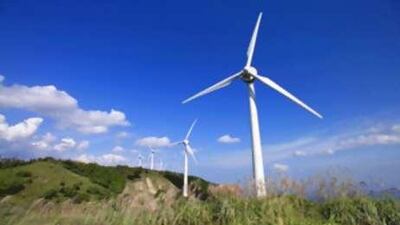Abu Dhabi Future Energy Company, or Masdar, has lured the Finnish wind-turbine manufacturer WinWinD to set up its business here through a ?120 million (Dh652m) investment in the company. As part of the deal, which will give Masdar "a significant minority stake" in WinWinD, the Finnish company has agreed to establish a corporate office in Abu Dhabi from which it will pursue global business development jointly with Masdar. The company also hopes to pursue research and development in the emirate, said Lassi Noponen, the executive chairman of WinWinD. It may "buy into" Masdar Institute, the clean-energy research organisation that Masdar is sponsoring as part of its carbon-neutral Masdar City development, he added. Mr Noponen said WinWinD planned to expand its business into the Middle East and North Africa (Mena), a decision that sprang from its alliance with Masdar. "Should we not have had Masdar as an investor, we would not have focused on that region as a geographic market," he said. "But there is a lot of wind potential in Mena, and with Masdar's help we can get a share of it." Masdar said the transaction underscored its commitment to become "a key player in wind energy markets". "Wind plays a crucial part within renewable energy, as it is commercially competitive today. It is important for Masdar to be part of that growth," said Sultan al Jaber, the company's chief executive. Masdar said it would work with the managements of WinWinD and its majority shareholder, India's Sterling Infotech, to accelerate WinWinD's expansion in Europe, India and the Middle East. It said a large part of its investment in WinWinD would go towards expanding the Finnish company's operations in India, where it already had a large manufacturing plant, in order to enhance the firm's global performance. Mr Noponen said he would expect WinWinD to supply equipment to wind projects in the Gulf region from its Indian facilities. Although the Gulf region, in contrast to North Africa, has a dearth of wind projects of any size, Mr Noponen said he hoped that WinWinD's specialised turbine designs could start to change that. Aside from the historical reliance on oil and gas in the region for power generation, a key reason that wind farms have not been built in the Gulf is that local wind conditions are generally unfavourable, in terms of both strength and reliability. But WinWinD has developed a new low-speed, high-efficiency series of turbines that can generate electricity at slow wind speeds. "One of the features of our technology is that we can do good production with less than perfect conditions," Mr Noponen said. Masdar, which is owned by the Abu Dhabi Government through Mubadala Development Company, has established beachheads in a number of renewable energy sectors under a US$15 billion (Dh55bn) government investment programme announced in January. Last month, it broke ground on a $230 million solar-panel factory in Germany as part of its plan to invest $2bn in thin-film photovoltaics manufacturing. In March, it announced a joint venture with Sener Grupo de Ingenieria, the Spanish engineering firm, to build solar power plants. Masdar is also pursuing a joint project with BP, the British energy company, and Rio Tinto, the Anglo-Australian mining and metals group, to build an integrated power generation and carbon-capture project. tcarlisle@thenational.ae

UAE's Masdar invests in Finnish wind energy firm
The Abu Dhabi green project has secured a stake in one of the world's leading alternative energy companies.
Most popular today
